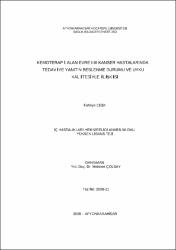Kemoterapi Alan Evre I-III Kanser Hastalarında Tedaviye Yanıtın Beslenme Durumu ve Uyku Kalitesiyle İlişkisi
Abstract
Çalışmamız, kemoterapi alan evre I-III kanser hastalarında tedavi yanıtının beslenme durumu ve uyku kalitesiyle iliskisinin belirlenmesi amacı ile gerçekleştirilmiştir. Kesitsel olarak planlanan arastırmada Süleyman Demirel Üniversitesi Araştırma ve Uygulama Hastaneleri Zehra Ulusoy Onkoloji Merkezi kemoterapi ünitesine basvuran, arastırma sınırlılıklarına uygun 19 meme, 4 kolon ve 7 akciğer kanserli 30 olgunun verileri değerlendirildi. Tüm hastalarımıza sosyodemografik özellik formu, SGA, BİA, Pittsburgh Uyku Kalite İndeksi, Beck Anksiyete ve Beck Depresyon Ölçeği uygulandı. Bu değerlendirmeler Eylül 2006-Ekim 2007 tarihleri arasında, kemoterapiden önce ve 6. kür kemoterapiden sonra toplam 2 defa olarak yapıldı. Çalısma için hastaneden ve hastalardan yazılı izin alındı. Arastırmamızda olguların %76,7’sinin tedaviye yanıt verdiği, %23,3’ünün progressif olduğu saptandı. Kanser türü, cinsiyet ve meslek tedavi yanıtı ile yakından iliskili bulundu. Hastalarımızda beslenme durumu kemoterapi öncesi ve sonrası SGA ile, bozulmus olarak saptandı. Bununla birlikte kötü beslenme oranı anlamlı olmamakla beraber kemoterapi sonrasında azalmaktadır. Ayrıca, üst orta kol çevresi ve subscapular deri kıvrım kalınlığı kemoterapi sonrasında anlamlı olarak yükselmisti. BĐA ile tespit edilen yağ kitlesi tedavi cevabı olan hastalarda artarken, progressif hastalarda toplam vücut suyu ve bazal metabolik hız anlamlı sekilde artmıstı. Olgularımızda kötü uyku kalitesi oranı tedavi öncesi %96,7 ve 6. Kür kemoterapi sonrası %100’dü. Bununla birlikte çalısmamızda hastaların 6. Kür kemoterapi sonrasında öznel uyku kalitesi skorlarının anlamlı sekilde arttığı ve uyku sürelerinin azaldığı saptandı. Kemoterapi alınan süreçte toplam uyku süresindeki bu azalmaya karsın, uyku ilacı kullanma ve gündüz islev bozukluğu yasama durumu normal sınırlarda bulundu. Hasta grubumuzda tedaviye yanıt ile uyku kalitesi arasında istatistiki anlamlı fark saptanmadı. Sonuç olarak kanser hastalarında beslenme durumu ve uyku kalitesi bozulmustur. Kemoterapiye yanıt veren hastalarda beslenme durumu yükselmekte fakat uyku kalitesinde bir değisiklik olusmamaktadır. Farklı kanser türlerinde yapılan bu çalısma spesifik malignitelerde ve daha yüksek popülasyonla tekrarlanmalıdır. Our study was carried out to determine the relation of treatment response with nutrition status and sleep quality in patients with stage I-III cancer patients taking chemotherapy. In this cross-sectional study, the data of 19 breast, 4 colon and 7 lung with a total of 30 cancer cases that are suitable for study limitations who admitted to chemotherapy unit of Zehra Ulusoy Oncology Center of the Süleyman Demirel University Research and Training Hospital. All patients were eveluated by sociodemographic data form, SGA, BĐA, Pitssburgh sleep quality index, Beck Anxiety and Depression scales. And these eveluations were applied twice, between September 2006-October 2007; one before chemotherapy and the second, 6 months after the chemotherapy. Consent information were taken from all patients. In our study, it was detected that 76,7% of patients well responded to treatment while 23,3% were progressive according to treatment responses criteria of World heath organisation. The type of cancer, gender and occupation were found to be closely associated with treatment response. The nutritional status of stage I-III breast, colon and lung cancer patients, defined buy SGA, were highly disturbed both before chemotherapy and after 6 th cure chemotherapy; however, good nutrition rates were higher after the 6 th cure chemotherapy, although not statistically significant. It significant incrised that upper medium perimeter of arm and subscapular curve thicknees of skin after treatment. The fat mass measured by BĐA, was detected to increase in patients that response to treatment after the 6 th cure chemotherapy. In addition, the total body fluid and basal metabolic rates of progressive patients were detected to significantly increase.
The bad sleep quality rates of patients with breast, colon and lung cancers before treatment and after 6th cure chemotherapy were 96,7% and 100%, respectively. However, in our study, the objective sleep quality were statistically higher after 6 th cure chemotherapy in comparison to pre-chemotherapy stage and the sleep duration were significantly decreased, as well. Đnspite of the decrease in the total sleep time, during chemotherapy period, daytime functional disturbance and usage of sleep medication for 3 or more times were found to be 3,3% in both measurements. No significant difference was found between sleep quality before
treatment and after 6th cure chemotherapy. As a conclusion, nutritional status and sleep quality are disturbed in cancer patients. In patients responding chemotherapy, nutritional status is improved while there is no such change in sleep quality. This study, carried on different cancer types, should be repeated in specific malignities with greater populations.
Collections
- Yüksek Lisans Tezleri [667]



















